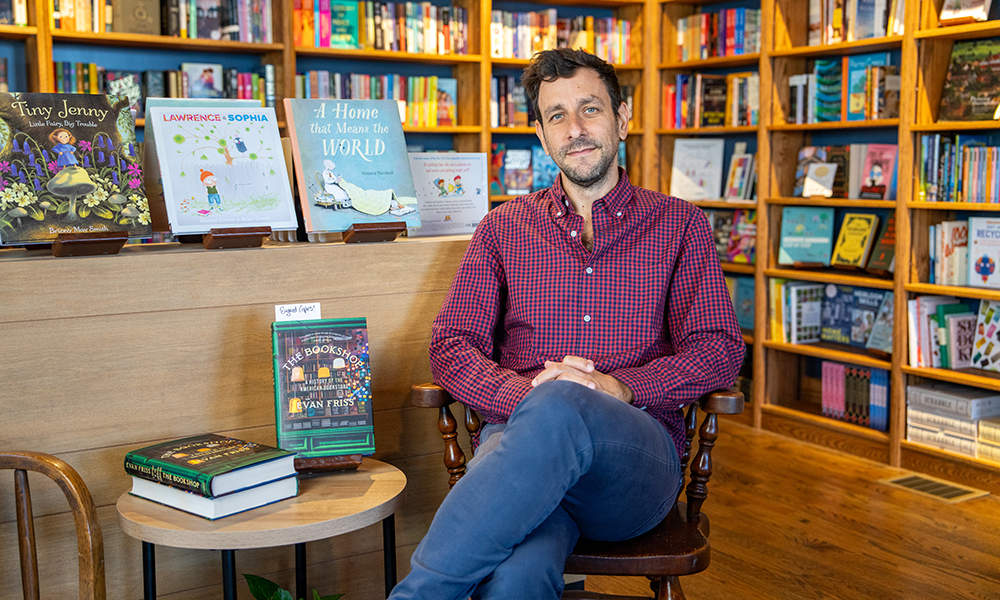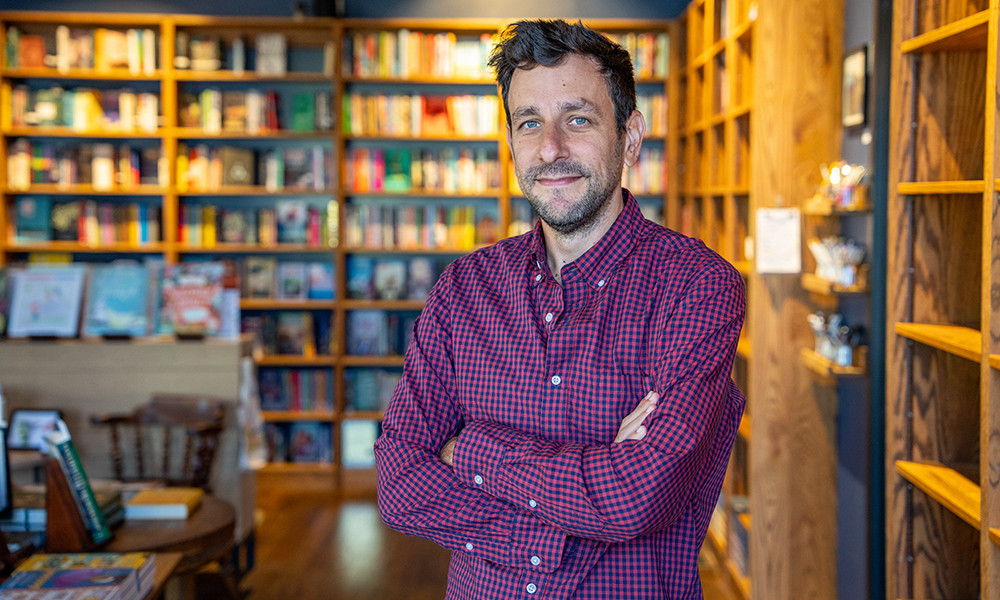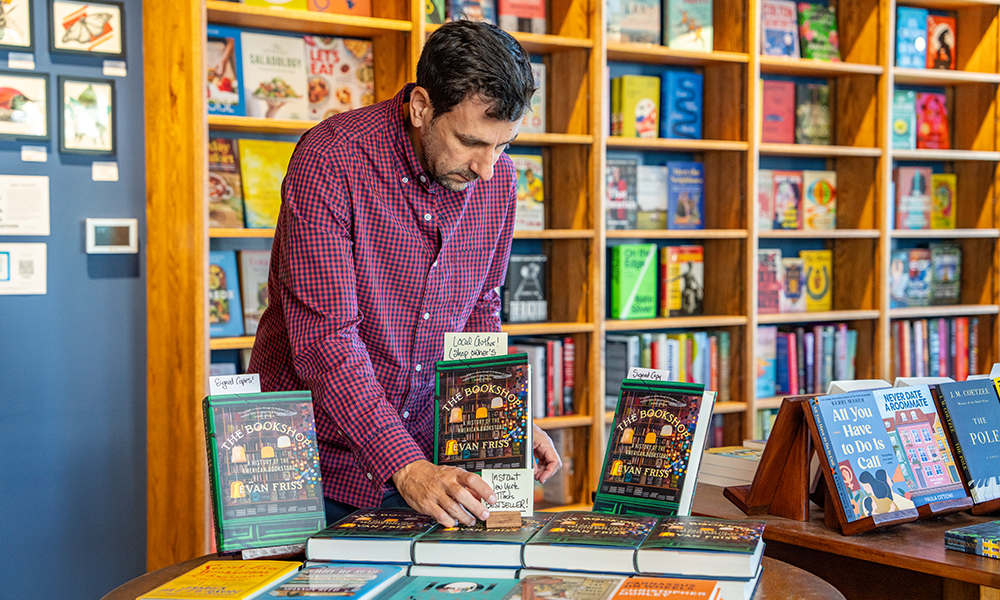Professor pens best-selling book about bookstores
Arts and Culture
SUMMARY: There’s something about a bookstore. That seemingly undefinable quality is exactly what JMU history professor Evan Friss hopes to answer in his best-selling book, “The Bookshop: A History of the American Bookstore.”
Hear more episodes and subscribe to the podcast at the Being the Change podcast page.
When history professor Evan Friss set out to study the storied history of bookstores, he never dreamed it would land him on The New York Times Best Sellers list. “It’s been very rewarding, and surprising and overwhelming,” Friss said.
The Bookshop: A History of the American Bookstore was published on Aug. 6 by Viking under the Penguin Random House umbrella. It’s being printed at Lakeside Book Company in Harrisonburg.
“My hopes have already been far exceeded,” Friss said. “I felt like it was a win when I got an agent. I felt like it was a win when I got a contract with Viking. So, The New York Times Best Sellers list feels like a lifetime achievement — and my publisher tells me it is.”
Friss hopes his book will help readers “develop or further their appreciation for how valuable bookstores have been and can be to American culture and life.”
A professor at JMU for 12 years, Friss, 44, teaches graduate and undergraduate courses in American history, as well as a class on American cities and urban history, and a new course, The History of Today.
“We read news stories, and historicize and contextualize them,” he said of the new course. “Since it’s an election year, people tend to talk about the Electoral College and presidential politics, but maybe don’t have a historical grounding. We’ll read the Constitution and some of the debates about, ‘What was the rationale for the Electoral College? How did it work? How does it work?’ … We’re not fighting or debating about these things, but it’s really uncovering the origins of some of these highly contentious and important current issues.”

Bookstores also have a vast history that people might not know about. “One surprising thing was how close to death bookstores have always been,” Friss said. “There’s this kind of perpetual doom-and-gloom about the business, and some of it’s for good reason. It’s a very hard business to be in.”
Booksellers face low profit margins and the threat of online stores offering similar items at discounted prices. Despite fears in the early 2000s that e-books and e-commerce would put bookstores out of business, Friss said bookstores have persisted. “I think there’s more optimism now than there probably has been in the last 20 or 30 years that they can survive,” he said.
|
“One surprising thing was how close to death bookstores have always been. There’s this kind of perpetual doom-and-gloom about the business, and some of it’s for good reason. It’s a very hard business to be in.” |
Having previously written for academic presses, Friss said his latest book was a risky and unlikely endeavor. “I was an avid reader but never really hung out at bookstores,” he said.
That all changed when he was attending graduate school at New York University and would visit his now wife, Amanda, where she worked at Three Lives & Company bookstore in the West Village of Manhattan. Now she owns Parentheses Books in Harrisonburg.
“That experience planted the seed,” Friss said. As Amanda talked about her customers, he recalled, “I got a sense of how important these spaces could be for a segment of the population.”
After finishing some academic books about the ways in which American cities were transformed by the popularity of bicycles as a mode of transportation, he decided to write a comprehensive history of the American bookstore.
“As a historian,” Friss said, “I began asking questions like, ‘How do bookstores change over time, and why did so many of them disappear over the course of my lifetime? What were they first like? What different models have booksellers used, and how has marketing changed — and publishing?’”
In an era defined by digital screens, Friss said people seek out bookstores as not only a place to find books but also a place of refuge. “There’s a sort of sigh of relief that people have when walking into an actual bookstore and picking up an actual book,” Friss said. “[These days] everybody feels like their attention span is slipping away, and we have to sort of retrain our brains. And dedicated, close reading, I think, is a great way to do that.”

As with bookstores, themselves, Friss’ book has captured readers’ imaginations, surpassing expectations. In its best week so far, the book reached No. 9 among hardcover, nonfiction books on the NYT list and No. 5 on the Indie Bestsellers List. In August, it was Literary Hub’s best-reviewed nonfiction book, and in September, it was the No. 1 Best Seller in Commerce on Amazon.
When talking about his book, Friss is often asked about the 1998 film You’ve Got Mail, which explored the trouble that independent booksellers had when competing with large corporate chains like Barnes & Noble. “I have a whole chapter in the book about Barnes & Noble and superstores, and I interviewed the current CEO. But I also interviewed the person who basically was Joe Fox in the movie — the man who made Barnes & Noble into a national powerhouse.”
Leonard Riggio didn’t normally give interviews. “He was often villainized as the person who killed all these independent bookstores,” Friss recalled.
“I spent an afternoon with him, and I asked him about the movie. … And he said it really didn’t bother him at all. … ‘Look around today — you still see independent shops,’ [Riggio said.] … He said Barnes & Noble killed off its competitors, but that the indie stores were able to survive because they were different enough.”
You’ve Got Mail is “a powerful movie that stuck in a lot of people’s brains,” Friss said. “And one of the interesting things is how different the bookselling landscape is today. … Now that Amazon exists and is such a behemoth, the local bookshops and Barnes & Noble are more often allies, and they want to preserve brick-and-mortar book selling.”
